THE SON ALSO RISES
It’s always fascinating to be present at the creation of a crucial writer. Like James Joyce’s Portrait of the Artist as a Young Man, Eugene O’Neill’s Long Day’s Journey into Night, and Tennessee Williams’ The Glass Menagerie, D.H. Lawrence’s 1913 coming-of-age classic marks a metamorphosis: Sons and Lovers chronicles a writer’s conditional emancipation from a home that can’t hold him. To alter the Biblical prophecy, here the sins of the mother are visited on the son. The title correctly implies that sons and lovers are mutually exclusive.
Now in a faithful if plodding U.S. premiere that features a new U.K. adaptation by director Mike Brayndick, this co-production by Chicago’s Greenhouse Theater Center and On the Spot Theatre Company dutifully reprises Lawrence’s bittersweet memoir of a youth that seemed free but wore out fast.
Retrospectively recalling Lawrence’s bringing-up (and -down) in England’s Midlands at the turn of the last century, this 135-minute “origins tale” roots us in the farms and collieries of Nottinghamshire where Paul Morel’s coal-mining father marries above his station. A temperamental failure, Walter will come to rue a lifelong misalliance.
But Lawrence’s searing focus is on Paul’s mother, a compelling presence both nurturing and despotic, flawed and forceful. We taste the complicated confusion that this mother will sow, spoiling the prospects of the (other) female lovers in Paul’s formative time.
In his earliest memories Paul (Miles Bochard) senses that a shadow has been cast over his parents. As narrated by Brian Boller playing the grown-up Lawrence, Paul’s hard-drinking and emotionally absent dad (Stephen Dunn) is plain-spoken, poor, and fatefully mismatched in a passionate but dead-end liaison with respectable Lydia (Amy Gray). (Curiously, her name is originally Gertrude in the novel.) Never to be satisfied, she’s a draining, tough-loving lady who allows little room for any other woman in Paul’s life.
Walter and Lydia’s lives and love will be consumed in regrets and recriminations torturously shared with Paul and his older brother William (also Boller). Watching their parents going at it, these boys who will always suspect that sex is a trap.
After William is abruptly eliminated by an early death, Paul finds work in London as a promising painter. But, drawn back for better and worse, he’s torn between farmer’s daughter Miriam Leivers (Corrie Riedl) and the miserably married Clara Dawes (Emma Brayndick). This proto-feminist mistress proves more erotic than the religious Miriam (“Eternity be damned!”).
But for Paul the spell cast by his jealous mother (“clever, ironical, delicately molded”) always finds “dull emptiness where love ought to be.” This mother will punish him for her own wasted hopes and damaged dreams: Paul’s “darkness” finds no saving light.
Convincing as Nottinghamshire country folk enduring more than enjoying their fates, Brayndick’s eleven-member ensemble (who also include Heidi Drennan, Tina Shelley, Pete Blatchford, Baird Brutscher and Erika B. Caldwell) combine with an eclectic musical score to provide all the atmosphere that the neurasthenic novel’s adaption demands.
Though not as erotic as Lawrence’s later Lady Chatterley’s Lover, this Sons and Lovers combusts whenever necessary. Borchard conveys Paul’s Oedipus-like dependence on a smothering mother who means well in the worst way. Gray is less successful at suggesting the crushing control that Lydia wields like a weapon. Still, a story this rich demands to be dramatized.
photos by Lisa Lennington and Mike Brayndick
Sons and Lovers
Greenhouse Theater Center & On The Spot Theatre Company
Greenhouse (Upstairs Main Stage) 2257 N. Lincoln Ave.
Thurs-Sat at 7:30; Sun at 2:30
ends on September 29, 2019
for tickets, call 773.404.7336 or visit Greenhouse
for more shows, visit Theatre in Chicago

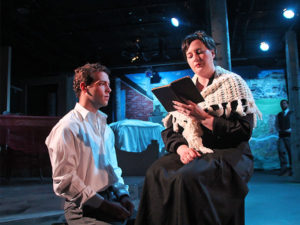
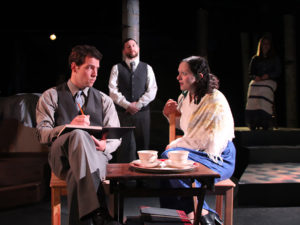


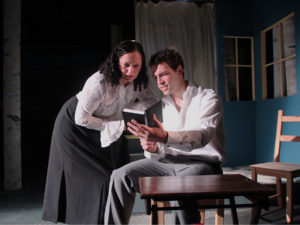
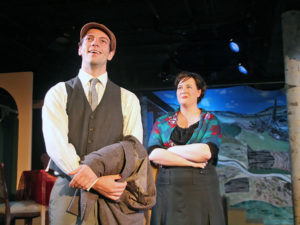
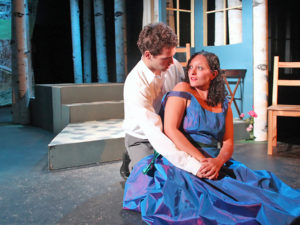
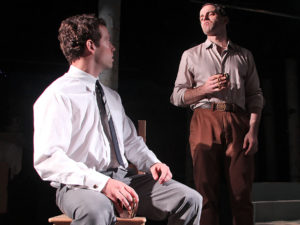
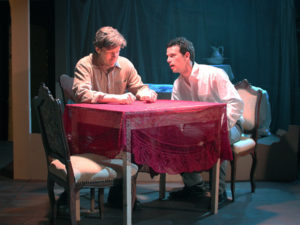
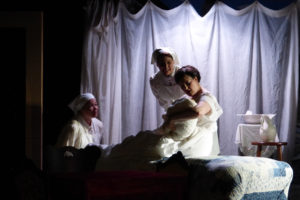

{ 1 comment… read it below or add one }
As always, a beautifully written review. I must see this